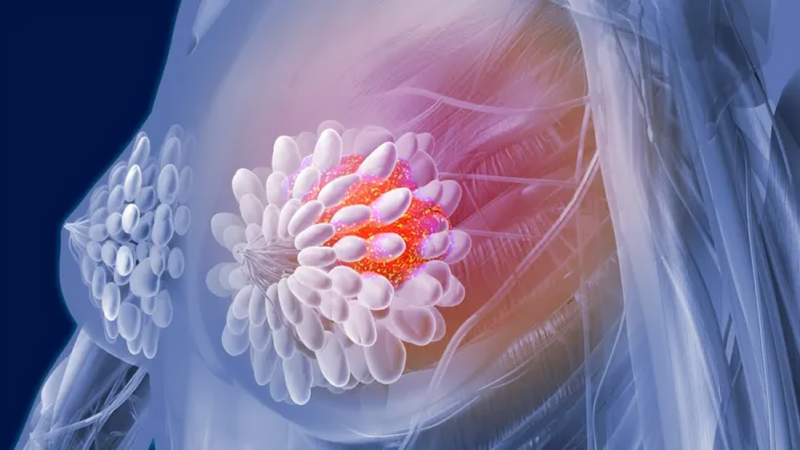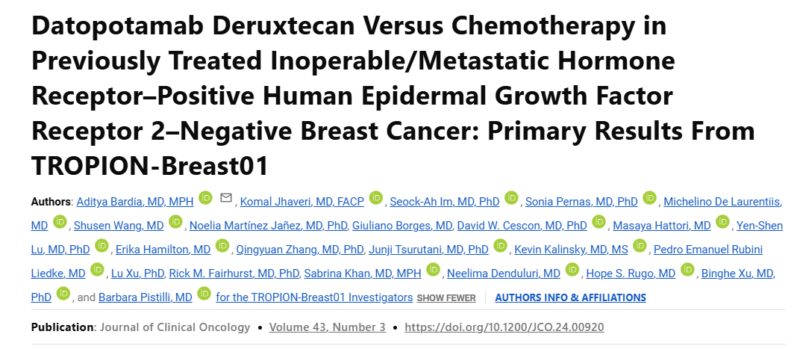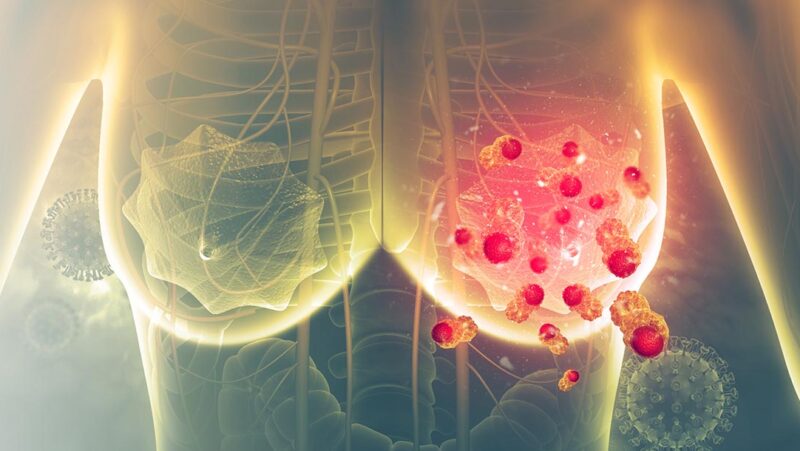On January 17, 2025, the FDA approved datopotamab deruxtecan-dlnk, a Trop-2-directed antibody and topoisomerase inhibitor conjugate, for adults with unresectable or metastatic HR-positive, HER2-negative breast cancer who had prior endocrine and chemotherapy treatment.
Efficacy was evaluated in TROPION-Breast01, a multicenter, open-label, randomized trial. 732 patients were randomized (1:1) to either datopotamab deruxtecan-dlnk (n=365) or investigator’s choice of chemotherapy (n=367), with chemotherapy options including eribulin (60%), capecitabine (21%), vinorelbine (10%), or gemcitabine (9%). Patients had to have experienced disease progression, been deemed unsuitable for further endocrine therapy, and received one or two lines of prior chemotherapy for unresectable or metastatic disease.
The major efficacy outcome measures were progression-free survival (PFS) and overall survival (OS). Median PFS was 6.9 months for the datopotamab deruxtecan-dlnk arm, compared to 4.9 months for the chemotherapy arm (Hazard ratio 0.63, p-value <0.0001). Median OS was 18.6 months for the datopotamab deruxtecan-dlnk arm, compared to 18.3 months for the chemotherapy arm (Hazard ratio 1.01, p-value not statistically significant). The confirmed ORR was 36% for the datopotamab deruxtecan-dlnk arm and 23% for the chemotherapy arm, with a median DOR of 6.7 months versus 5.7 months.

The most common adverse reactions (≥20%) included stomatitis, nausea, fatigue, decreased leukocytes, alopecia, decreased hemoglobin, dry eye, vomiting, and increased ALT/AST. The recommended dose of datopotamab deruxtecan-dlnk is 6 mg/kg (maximum 540 mg for patients ≥90 kg), administered as an intravenous infusion once every 3 weeks, until disease progression or unacceptable toxicity.
About Datopotamab deruxtecan-dlnk
Datopotamab deruxtecan-dlnk is a Trop-2-directed antibody and topoisomerase inhibitor conjugate approved by the FDA on January 17, 2025. It is designed for the treatment of adult patients with unresectable or metastatic, hormone receptor (HR)-positive, HER2-negative breast cancer who have previously received endocrine-based therapy and chemotherapy for their unresectable or metastatic disease.
The drug was evaluated in the TROPION-Breast01 trial, which demonstrated significant improvements in progression-free survival (PFS), with a median PFS of 6.9 months for the datopotamab deruxtecan-dlnk arm, compared to 4.9 months in the chemotherapy arm. However, overall survival (OS) was similar between both arms.
Common side effects include stomatitis, nausea, fatigue, and various hematologic abnormalities such as decreased leukocytes and anemia. The recommended dose is 6 mg/kg, administered as an intravenous infusion every 3 weeks, until disease progression or unacceptable toxicity occurs.
The TROPION-Breast01 trial
The TROPION-Breast01 study titled “Datopotamab Deruxtecan Versus Chemotherapy in Previously Treated Inoperable/Metastatic Hormone Receptor–Positive Human Epidermal Growth Factor Receptor 2–Negative Breast Cancer: Primary Results From TROPION-Breast01” published on Journal of Clinical Oncology was a global, phase 3, open-label, randomized trial evaluating the effectiveness of datopotamab deruxtecan (Dato-DXd), a trophoblast cell surface antigen 2 (Trop-2)-directed antibody-drug conjugate, versus investigator’s choice of chemotherapy (ICC) in hormone receptor–positive, human epidermal growth factor receptor 2–negative (HR+/HER2-) breast cancer. Adult patients with inoperable or metastatic HR+/HER2- breast cancer who had disease progression on endocrine therapy and had received one to two prior chemotherapy lines were randomly assigned to Dato-DXd (6 mg/kg once every 3 weeks) or ICC (eribulin, vinorelbine, capecitabine, or gemcitabine).
Authors: Aditya Bardia, Komal Jhaveri, Seock-Ah Im, Sonia Pernas, Michelino De Laurentiis, Shusen Wang, Noelia Martínez Jañez, Giuliano Borges, David W. Cescon, Masaya Hattori, Yen-Shen Lu, Erika Hamilton, Qingyuan Zhang, Junji Tsurutani, Kevin Kalinsky, Pedro Emanuel Rubini Liedke, Lu Xu, Rick M. Fairhurst, Sabrina Khan, Neelima Denduluri, Hope S. Rugo, Binghe Xu, Barbara Pistilli.

The study’s primary endpoints were progression-free survival (PFS) by blinded independent central review (BICR) and overall survival (OS). Results showed that Dato-DXd significantly reduced the risk of progression or death, with a PFS hazard ratio (HR) of 0.63 (P < .0001), indicating a significant benefit over ICC. Although OS data were not fully mature, a trend favoring Dato-DXd was observed, with a HR of 0.84.
Safety analysis revealed that the rate of grade ≥3 treatment-related adverse events (TRAEs) was lower for Dato-DXd compared to ICC (20.8% vs. 44.7%). The most common TRAEs with Dato-DXd were nausea (51.1%) and stomatitis (50%), while neutropenia (42.5%) was the most common with ICC. Overall, Dato-DXd demonstrated a statistically significant improvement in PFS and a favorable safety profile, supporting its use as a novel treatment option for patients with metastatic HR+/HER2- breast cancer.
About Breast Cancer
Breast cancer is a type of cancer that originates in the cells of the breast tissue. It can develop in both women and men, although it is more common in women. The cancer begins when abnormal cells in the breast grow uncontrollably, forming a tumor, which can be either benign (non-cancerous) or malignant (cancerous), with malignant tumors having the ability to spread.

Breast cancer is the second most common cancer diagnosed in women in the U.S., after skin cancer. Early detection through screening, such as mammograms, plays a crucial role in diagnosing it at an earlier, more treatable stage. The survival rates for breast cancer have been improving, largely due to advances in early detection, treatment options, and increased awareness and research funding.
While some cases can be cured, others may not be completely treatable, but can still be managed with treatment. In cases where a cure isn’t possible, many therapies are available to extend life and improve quality of life. Personalized treatments and targeted therapies are helping healthcare professionals select the most appropriate treatment, leading to better outcomes and improved chances of long-term survival.
